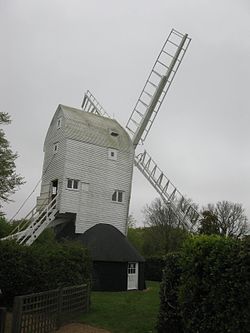| Stocks Mill, Wittersham | |
|---|---|
 The mill in May 2016 | |
 | |
| Origin | |
| Grid reference | TQ 912 272 |
| Coordinates | 51°0′48″N0°43′33″E / 51.01333°N 0.72583°E |
| Operator(s) | Kent County Council |
| Year built | 1781 |
| Information | |
| Purpose | Corn milling |
| Type | Post mill |
| Roundhouse storeys | Single storey |
| No. of sails | Four |
| Type of sails | Spring sails |
| Windshaft | Wood with a cast iron poll end |
| Winding | Tailpole |
| No. of pairs of millstones | Two pairs, arranged Head and Tail |
Stocks Mill is a Grade II* listed [1] [2] post mill in Wittersham on the Isle of Oxney, in Kent, England which has been preserved.
